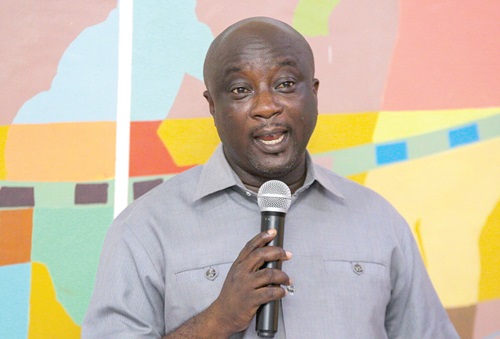The Minister for Tourism, Arts and Culture, Abla Dzifa Gomashie, has reaffirmed the government’s commitment to revitalise the country’s performing arts industry through strategic investments, infrastructural development and increased global visibility for Ghanaian artistes.
Speaking at an event to mark World Theatre Day at the School of Performing Arts, University of Ghana, Legon, the sector minister, in a speech read on her behalf by the Director of Arts & Culture, Divine Owusu-Ansah, outlined a series of government-backed initiatives aimed at strengthening the creative economy.
He highlighted ongoing efforts such as the construction of amphitheaters across the country and the renovation of the National Theatre, projects designed to provide world-class platforms for local artistes to showcase their talents and contribute to national development.
He emphasised the government’s vision to position the arts as a key driver of economic empowerment, adding that,“Our theatre has long been a voice for the people, a tool for social change, and an inspiration for our collective identity”.
Event
The event, organised by Globe Productions in collaboration with the Department of Theatre Arts at UG, Legon, and the Ghana Centre of the International Theatre Institute (ITI), was held on the theme: “Ghana’s Creative Economy: Theatre as the Heartbeat of Cultural Innovation and Economic Empowerment.”
![]()
Among the distinguished guests were the Spanish Ambassador to Ghana, Ángel Lossada Torres-Quevedo; the Dean of the School of Performing Arts, Prof. Awo Mana Asiedu; the President of ITI, Hajia Akosua Abdallah, and prominent Ghanaian, actors including Fred Amugi, Adjetey Anang, Fiifi Coleman and Latif Abubakar.
Sustainability
The acting Chief Executive Officer (CEO) of the Ghana Tourism Development Company Ltd., Prof. Kobby Mensah, called for a more sustainable and inclusive approach to tourism and heritage conservation in the country.
He cautioned against a model that prioritised commercial interests over cultural preservation, hence urged policymakers to rethink their strategies to ensure long-term sustainability.
“Too often, our approach to heritage conservation is dictated by what is commercially viable rather than what is ethically right or historically significant,” he said.
Prof. Mensah expressed concern about culturally significant sites that did not promise immediate financial returns and were frequently neglected, posing a threat to the country’s historical identity.
He challenged the government and tourism agencies to shift their focus towards sustainability to ensure that the country’s heritage remained intact for future generations.
While acknowledging the success of initiatives such as the Year of Return and Beyond the Return, which have drawn thousands of African Americans and the global African diaspora to Ghana, he raised critical concerns about the future of diaspora tourism.
“Are younger African Americans still interested in the Pan-African and diaspora heritage conversation? Will their focus remain on heritage, or will it shift towards commerce-driven tourism?” he asked.
Voice
The acting Dean of the School of Performing Arts, for her part, called on theatre practitioners to use their voices to address pressing social issues, emphasising that theatre was a powerful tool for social transformation.
She urged artistes to use their platforms to raise awareness about environmental concerns, social justice and national development.
A renowned actor and CEO of Fiifi Coleman Productions, Fiifi Coleman, appealed to theatre practitioners to be actively included in the country’s national tourism agenda.
He emphasised the need to export Ghanaian theatre to a global audience, calling for intentional strategies to position local productions on international stages.
“Theatre is a collaborative art form. We must hold each other’s hands and work together.
If we each work in isolation, we will only go so far. But together, we can achieve much more,” he added.
A Ghanaian playwright and the chief executive director of Globe Productions, Latif Abubakar, said,” the day was to reflect on the positives of theatre, its contributions to society, and how we can make it more impactful.”
“Although it is a global celebration, this time we focused on Ghana—zooming in on our major challenges, exploring what we can do as practitioners to bridge those challenges, and identifying potential partners who can help us to achieve our goals,” he added:
He urged the creative arts industry in the country to move beyond passion and focus on power, profit, and progress to build a sustainable creative economy.
Commitment
The head of UNESCO Office in Accra, Edmond Moukala N'Gouemo, in a speech read on his behalf , announced a new partnership between UNESCO and Ghanaian playwright, Chief Moomen, aimed at promoting the General History of Africa through theatrical productions.

